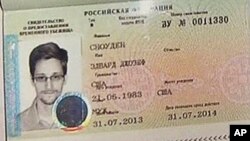Edward Snowden isn't the first National Security Agency insider to leave the United States and spill spy agency secrets.
It hasn't gone according to plan for Snowden, who fled to Hong Kong and then spent more than a month marooned in the transit zone of a Moscow airport before finally getting his temporary asylum papers on Thursday.
And it didn’t go well for a couple of NSA defectors who came long before him.
William Martin and Bernon Mitchell were friends working at the National Security Agency in the late 1950s. The two were working in a highly technical field – the code-related work known as cryptology.
In the course of their work, Martin and Mitchell came across highly-secret documents, says David Barrett, a national security expert now teaching at Villanova University.
“For example, they became aware that not only was the NSA listening in to the communications of foreign countries that were enemies or rivals, like the Soviet Union, they discovered that the National Security Agency was also monitoring communications of countries that were our allies,” Barrett said. “And they thought this was deeply offensive and just wrong.”
Barrett said the two also learned that the American government was intercepting and reading mail that came into the U.S. from other countries.
And now more than half a century later, Snowden, is accusing the agency of doing more or less the same thing.
The two men were disillusioned
Barrett says Martin and Mitchell were disillusioned and decided to do something about it.
“They noticed the idealistic language that President [Dwight] Eisenhower used in his speeches – public speeches – and compared it to some of what they knew the government was doing and so they decided to defect to the Soviet Union.”
Barrett says that in June of 1960, Martin and Mitchell told their superiors they were going on a month-long vacation to visit family and friends. But instead, they made their way to Moscow via New Orleans, Mexico City and Cuba.
When they didn’t return from vacation, their superiors got suspicious. Barrett says two months later, the NSA issued a statement saying agency “mathematicians” might have defected behind the Iron Curtain.
“But they said there is no way that anything that these two guys know could do any harm to the security of the U.S.,” he said. “And so it was treated as sort of a small event and initially, the press simply accepted that story that it was a small event.”
On September 6, 1960, Martin and Mitchell held a news conference in Moscow. Barrett says “there was a real outpouring of information about the National Security Agency.”
No Such Agency
“It became on the public record what the National Security Agency was, what it was doing,” he said. “Honestly, until this defection, there was almost no public knowledge of the NSA. And in fact, people around Washington who knew that it existed would joke that NSA stood for ‘No Such Agency.’”
Barrett says President Eisenhower referred to the two defectors as “self-confessed traitors,” and former president Harry Truman said “they ought to be shot.”
“There wasn’t much that Martin and Mitchell offered the Soviets after the passage of some months or maybe a year – and they just became these sorts of exiles in the Soviet Union,” Barrett said.
“They chose the Soviet Union in part because they thought it was a workers’ paradise,” he continued. “They thought it would be a wonderful place to live. And the story after that is not really a happy story because they became disillusioned with life in the Soviet Union – it was no kind of paradise.”
Peter Savodnik, who has written about American defectors, says Martin, Mitchell and others were far different from those who decided to move to the Soviet Union in the 1920s and 1930s.
“In the Cold War era [roughly 1947-1991], they tended to be a much sadder set of people – people who are really disenfranchised, who really feel sort of spiritually at sea,” Savodnik said. “The Soviet Union was not so much a beacon of hope for them, as it was an escape.”
William Martin died in 1987 at the age of 56, while Bernon Mitchell died in 2001 at the age of 72.
Snowden’s temporary asylum visa for Russia is valid for one year. No one knows yet where he goes from there – or even if he’ll stay in Russia that long.
It hasn't gone according to plan for Snowden, who fled to Hong Kong and then spent more than a month marooned in the transit zone of a Moscow airport before finally getting his temporary asylum papers on Thursday.
And it didn’t go well for a couple of NSA defectors who came long before him.
William Martin and Bernon Mitchell were friends working at the National Security Agency in the late 1950s. The two were working in a highly technical field – the code-related work known as cryptology.
In the course of their work, Martin and Mitchell came across highly-secret documents, says David Barrett, a national security expert now teaching at Villanova University.
“For example, they became aware that not only was the NSA listening in to the communications of foreign countries that were enemies or rivals, like the Soviet Union, they discovered that the National Security Agency was also monitoring communications of countries that were our allies,” Barrett said. “And they thought this was deeply offensive and just wrong.”
Barrett said the two also learned that the American government was intercepting and reading mail that came into the U.S. from other countries.
And now more than half a century later, Snowden, is accusing the agency of doing more or less the same thing.
The two men were disillusioned
Barrett says Martin and Mitchell were disillusioned and decided to do something about it.
“They noticed the idealistic language that President [Dwight] Eisenhower used in his speeches – public speeches – and compared it to some of what they knew the government was doing and so they decided to defect to the Soviet Union.”
Barrett says that in June of 1960, Martin and Mitchell told their superiors they were going on a month-long vacation to visit family and friends. But instead, they made their way to Moscow via New Orleans, Mexico City and Cuba.
When they didn’t return from vacation, their superiors got suspicious. Barrett says two months later, the NSA issued a statement saying agency “mathematicians” might have defected behind the Iron Curtain.
“But they said there is no way that anything that these two guys know could do any harm to the security of the U.S.,” he said. “And so it was treated as sort of a small event and initially, the press simply accepted that story that it was a small event.”
On September 6, 1960, Martin and Mitchell held a news conference in Moscow. Barrett says “there was a real outpouring of information about the National Security Agency.”
No Such Agency
“It became on the public record what the National Security Agency was, what it was doing,” he said. “Honestly, until this defection, there was almost no public knowledge of the NSA. And in fact, people around Washington who knew that it existed would joke that NSA stood for ‘No Such Agency.’”
Barrett says President Eisenhower referred to the two defectors as “self-confessed traitors,” and former president Harry Truman said “they ought to be shot.”
“There wasn’t much that Martin and Mitchell offered the Soviets after the passage of some months or maybe a year – and they just became these sorts of exiles in the Soviet Union,” Barrett said.
“They chose the Soviet Union in part because they thought it was a workers’ paradise,” he continued. “They thought it would be a wonderful place to live. And the story after that is not really a happy story because they became disillusioned with life in the Soviet Union – it was no kind of paradise.”
Peter Savodnik, who has written about American defectors, says Martin, Mitchell and others were far different from those who decided to move to the Soviet Union in the 1920s and 1930s.
“In the Cold War era [roughly 1947-1991], they tended to be a much sadder set of people – people who are really disenfranchised, who really feel sort of spiritually at sea,” Savodnik said. “The Soviet Union was not so much a beacon of hope for them, as it was an escape.”
William Martin died in 1987 at the age of 56, while Bernon Mitchell died in 2001 at the age of 72.
Snowden’s temporary asylum visa for Russia is valid for one year. No one knows yet where he goes from there – or even if he’ll stay in Russia that long.






